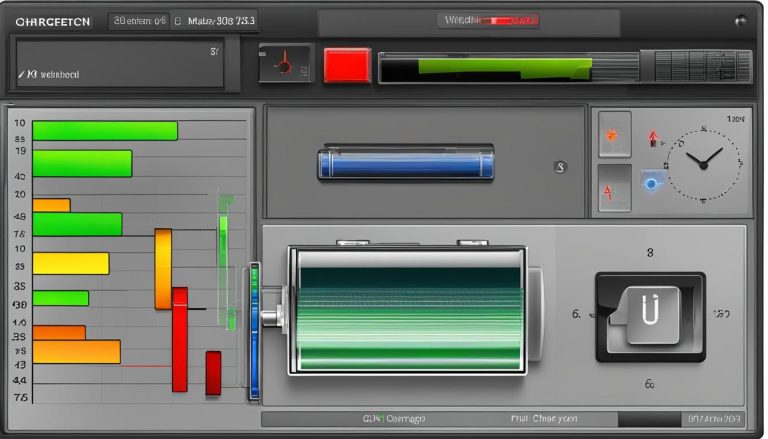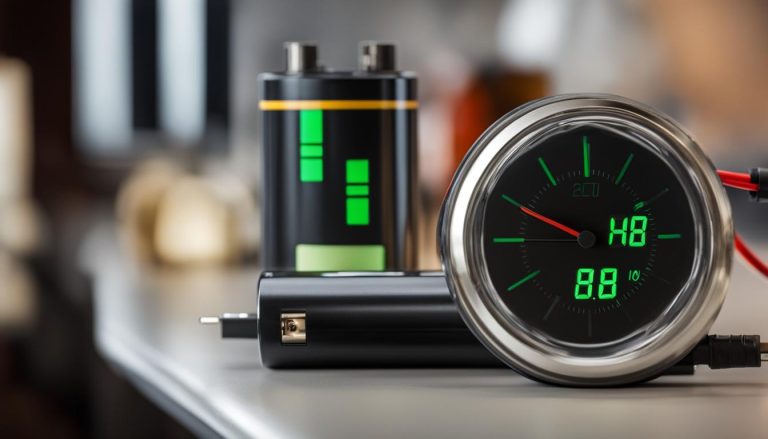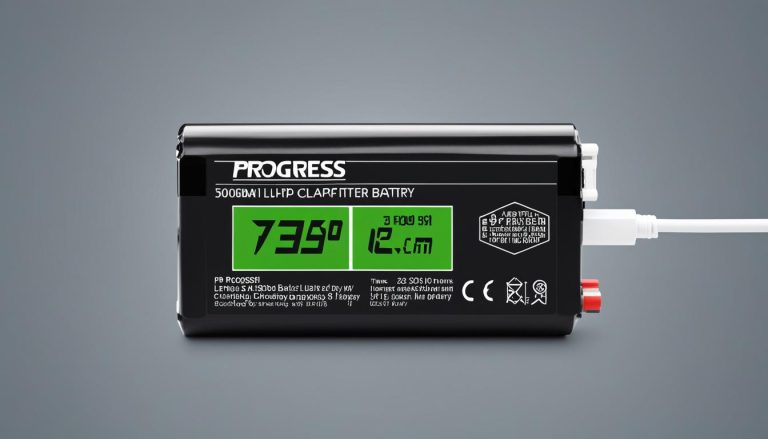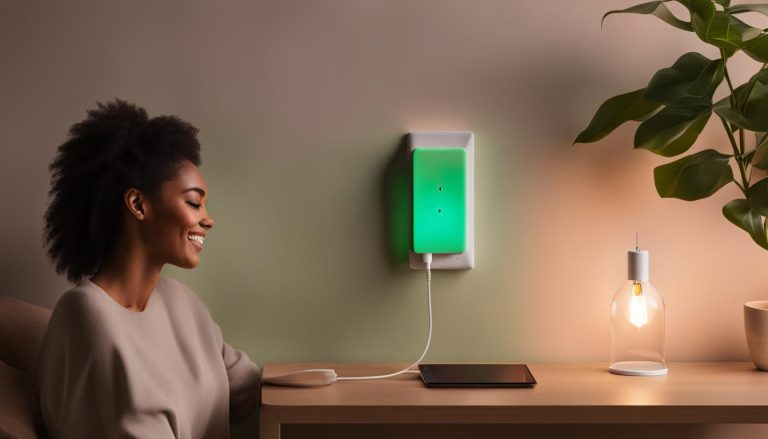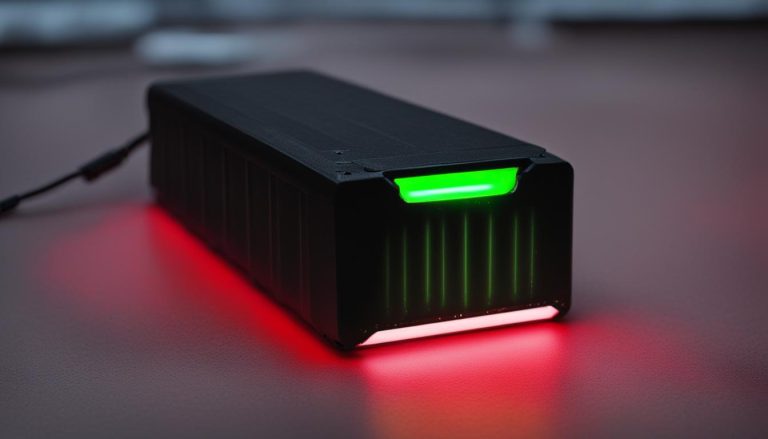Charge Time for a Lithium Battery Explained
batterychargers.site and its partners may earn a commission if you purchase a product through one of our links
Are you curious about how long it takes to charge a lithium battery? Understanding the charge time for a lithium battery is essential for maximizing its performance and lifespan. In this article, we will delve into the factors that influence the charging time of a lithium battery and provide tips for faster charging.
Key Takeaways:
- The average charge time for a lithium battery is approximately 2-3 hours, but charging at 0.8C or less is recommended for prolonged battery life.
- A full charge is reached when the current decreases to between 3 and 5 percent of the Ah rating.
- Factors such as battery capacity, charge rate, and voltage thresholds set by the charger can affect the charging time.
- To optimize charging time, use a charger with a higher C-rate, calculate charging time based on battery capacity and charge current, and avoid overcharging.
- Using a charger designed specifically for lithium batteries ensures proper charging and prevents damage.
Factors Affecting Lithium Battery Charging Time
When it comes to charging a lithium battery, several factors come into play that can affect the overall charging time. Understanding these factors is crucial in determining the optimum charging duration for your battery.
Battery Capacity:
The capacity of the battery, measured in ampere-hours (Ah), plays a significant role in charging time. Higher capacity batteries generally take longer to charge compared to lower capacity ones. This is because larger batteries require more energy to reach their full charge.
Charge Rate (C-rate):
The charge rate refers to the current at which the battery is charged. Charging at a higher C-rate can significantly reduce the charging time. However, it’s important to consider that higher charge rates can put additional stress on the battery and may decrease its overall lifespan.
Voltage Thresholds:
Chargers typically have voltage thresholds that determine the charging time. These thresholds are set to control the charging process and ensure the battery’s safety. Different voltage thresholds, such as 4.10V or 4.20V per cell, can impact the charging time and the overall state of charge reached.
By considering these factors, you can optimize the charging time for your lithium battery and ensure its longevity and performance.
Tips for Faster Charging of Lithium Battery
Want to charge your lithium battery quickly? Here are some tips to help you achieve faster charging:
- Use a charger with a higher C-rate: Charging your battery at a higher C-rate can significantly reduce the charging time. However, be cautious not to exceed the battery’s recommended charge rate to avoid damaging it.
- Calculate the charging time: You can estimate the time it takes to fully charge your battery by dividing its capacity (in Ah) by the charge current (in A). This calculation provides a rough estimate of the charging duration.
- Avoid overcharging: Overcharging can negatively impact the performance and lifespan of your lithium battery. It’s crucial to disconnect the charger once the battery reaches its full charge to prevent any potential damage.
- Choose a suitable charger: Using a charger specifically designed for lithium batteries ensures optimal charging and prolongs the battery’s lifespan. Avoid using chargers that are not compatible or designed for other battery chemistries.
By following these tips, you can significantly reduce the charging time of your lithium battery while ensuring its health and longevity.
Tips for Faster Charging of Lithium Battery
When it comes to quick charging of a lithium battery, there are a few tips that can help you optimize the charging time. First and foremost, using a charger with a higher C-rate can result in faster charging. However, it is important to ensure that your battery is capable of handling the higher charge rate without experiencing excessive stress or overheating.
To calculate the charging time for your lithium battery, you can divide the battery capacity (in ampere-hours, Ah) by the charge current (in amperes, A). For instance, if you have a 10Ah battery and you are charging it at 5A, it would take approximately 2 hours to fully charge.
In addition to using a suitable charger and calculating the charging time accurately, there are other tips to consider. Avoid overcharging your lithium battery, as it can lead to damage and reduce the battery’s overall lifespan. Also, make sure to maintain the battery at the recommended voltage thresholds to ensure its proper functioning and longevity.
Lastly, always use a charger specifically designed for lithium batteries to ensure safe and efficient charging. By following these tips, you can maximize the charging speed of your lithium battery and keep it performing optimally for a longer period of time.
FAQ
How long does it take to charge a lithium battery?
The complete charge time for a lithium battery is approximately 2-3 hours, but it is recommended to charge at 0.8C or less to prolong battery life. Full charge is reached when the current decreases to between 3 and 5 percent of the Ah rating.
What factors can affect the charging time of a lithium battery?
The capacity of the battery, the charge rate (C-rate) used, and the voltage thresholds set by the charger can all impact the charging time. Higher capacity batteries may take longer to charge compared to lower capacity ones. Different voltage thresholds can also affect the charging time and the overall state of charge reached.
How can I optimize the charging time of a lithium battery?
To optimize the charging time of a lithium battery, you can use a charger with a higher C-rate, but make sure the battery can handle the higher charge rate without excessive stress or overheating. Calculating the charging time can be done by dividing the battery capacity (in Ah) by the charge current (in A). Avoiding overcharging and maintaining the battery at the recommended voltage thresholds can also help prevent damage and prolong battery life. It is important to use a charger designed specifically for lithium batteries.

